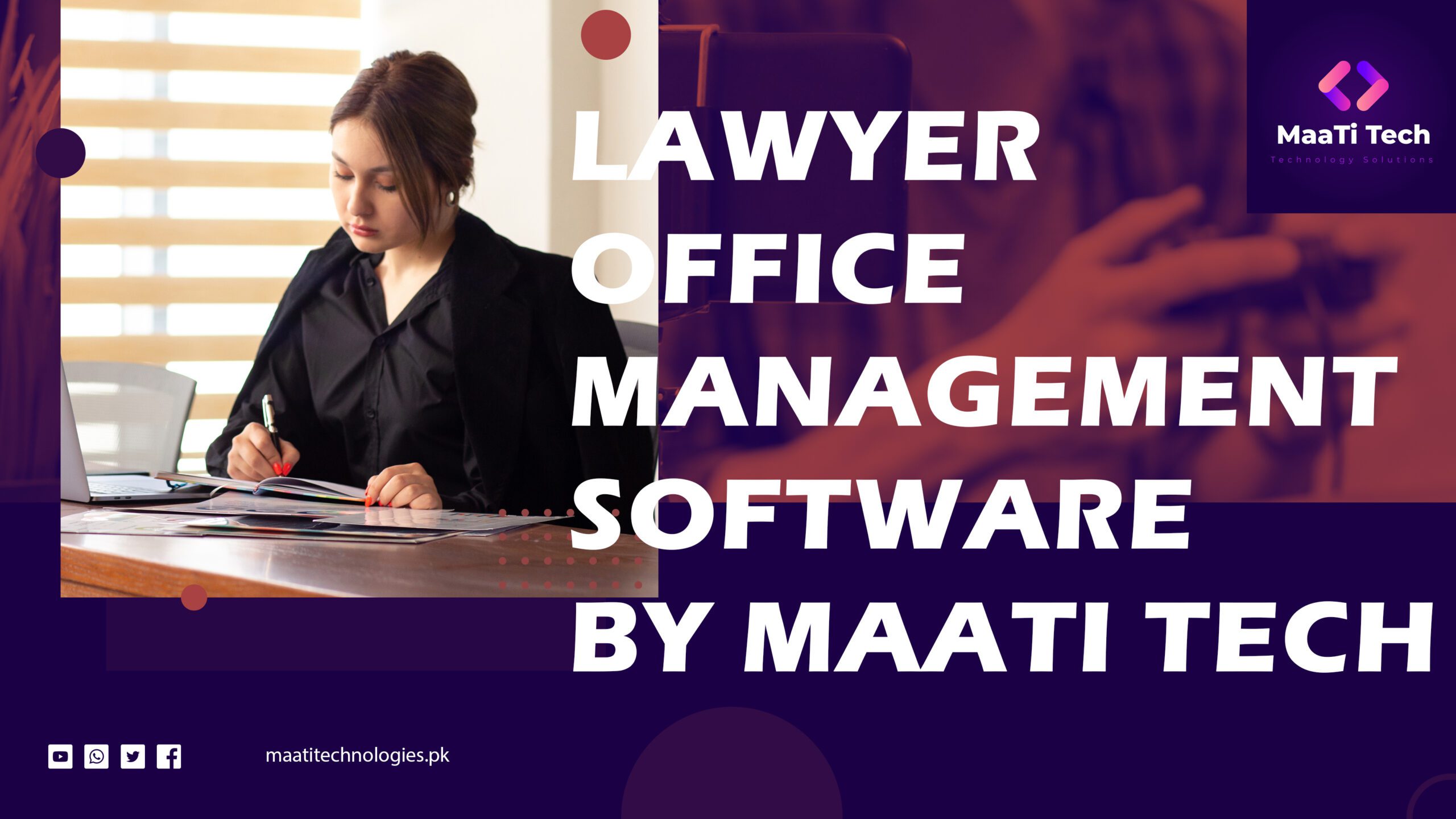Introduction to Lawyer Office Management Software
Table of Contents
What is Lawyer Office Management Software?
Lawyer office management software is a specialized digital solution designed to streamline and automate various administrative and operational tasks within a legal practice. This software typically includes features for case management, document management, time tracking, billing, client communication, and more. By consolidating these functions into a single platform, lawyer office management software helps legal professionals manage their workload more efficiently and effectively.
Importance of Office Management in Legal Practices
Effective office management is crucial for the success of any legal practice. It ensures that cases are handled promptly, client communications are managed efficiently, and administrative tasks do not hinder the firm’s productivity. Poor office management can lead to missed deadlines, lost documents, billing errors, and dissatisfied clients. Therefore, investing in a robust office management system is essential for maintaining a high standard of service and ensuring the smooth operation of a law firm.

History and Evolution of Legal Management Software
The evolution of legal management software began in the late 20th century with the advent of personal computers and the internet. Initially, law firms relied on basic software for word processing and accounting. As technology advanced, more specialized solutions emerged, offering features tailored to the unique needs of legal professionals. Today, modern legal management software leverages cloud computing, artificial intelligence, and mobile technology to provide comprehensive and integrated solutions that enhance productivity and client service.
Key Features of Modern Legal Management Software
Modern legal management software offers a wide range of features designed to meet the diverse needs of law firms. Some of the key features include:
- Document Management: Secure storage, organization, and retrieval of legal documents.
- Time Tracking and Billing: Accurate tracking of billable hours and generation of invoices.
- Case Management: Centralized management of case information, deadlines, and tasks.
- Client Relationship Management (CRM): Tools for managing client communications and relationships.
- Calendaring and Scheduling: Integration with calendars to manage appointments and deadlines.
- Task Automation: Automation of routine tasks to save time and reduce errors.
- Email Integration: Synchronization with email systems for seamless communication.
- Reporting and Analytics: Tools for generating reports and analyzing firm performance.
- Mobile Access: Access to software features on mobile devices for on-the-go productivity.
- Security: Robust security measures to protect sensitive client information.
Overview of Maati Tech and Their Software Solutions
Maati Tech is a leading provider of Lawyer office management software, known for its innovative and user-friendly solutions. Their software is designed to meet the needs of law firms of all sizes, offering a comprehensive suite of features that streamline administrative tasks and enhance client service. Maati Tech’s solutions are highly customizable, allowing firms to tailor the software to their specific needs and workflows. With a focus on security, efficiency, and user experience, Maati Tech is a trusted partner for law firms looking to modernize their operations and improve their management processes.
Benefits of Using Lawyer Office Management Software
Enhanced Efficiency and Productivity
One of the primary benefits of lawyer office management software is the significant boost in efficiency and productivity it provides. By automating routine tasks such as document management, time tracking, and billing, legal professionals can focus more on their core responsibilities. The software’s ability to centralize information and streamline workflows reduces the time spent on administrative tasks, allowing lawyers to handle more cases and serve more clients effectively.
Improved Client Communication and Relationship Management
Effective communication is critical in legal practice, and lawyer office management software enhances this aspect by providing tools for managing client interactions. Features such as email integration, client portals, and CRM systems ensure that all communications are documented and easily accessible. This not only improves client satisfaction by providing timely updates and responses but also helps in building stronger client relationships by maintaining a clear and organized communication history.
Streamlined Document Management
Document management is a core function of any legal practice, and lawyer office management software excels in this area. The software provides secure storage for all legal documents, making it easy to organize, retrieve, and share files. Advanced search functions allow quick access to specific documents, while version control features ensure that all changes are tracked and documented. This reduces the risk of lost or misplaced documents and improves overall document handling efficiency.
Accurate Time Tracking and Billing
Accurate time tracking and billing are essential for the financial health of a law firm. Lawyer office management software includes robust time tracking features that allow lawyers to record billable hours accurately. The software can generate detailed invoices based on the tracked time, ensuring that clients are billed correctly and promptly. This reduces billing disputes and helps maintain a steady cash flow for the firm.
Better Case and Matter Management
Managing cases and legal matters is a complex task that requires careful organization and attention to detail. Lawyer office management software provides comprehensive case management features that centralize all case-related information, including client details, case documents, deadlines, and tasks. This ensures that lawyers have all the information they need at their fingertips, enabling them to manage cases more effectively and efficiently.
Compliance and Risk Management
Compliance with legal regulations and managing risks are critical concerns for any law firm. Lawyer office management software helps firms stay compliant by providing tools for managing legal requirements, tracking deadlines, and maintaining accurate records. The software’s robust security features protect sensitive client information, reducing the risk of data breaches and other security incidents. Additionally, built-in audit trails and reporting tools help firms monitor their compliance status and identify potential risks proactively.

Detailed Breakdown of Features
Document Management Systems
Document management systems (DMS) are a fundamental component of lawyer office management software. A DMS allows law firms to store, organize, and retrieve documents efficiently. Key features include:
- Secure Storage: Ensures that all documents are stored in a secure, centralized location.
- Organization: Provides tools for categorizing and tagging documents for easy retrieval.
- Search Functionality: Allows users to quickly find documents using keywords or metadata.
- Version Control: Tracks changes to documents and maintains a history of revisions.
- Collaboration: Enables multiple users to work on documents simultaneously, with real-time updates.
Time and Billing Software
Time and billing software is crucial for tracking billable hours and generating accurate invoices. Features include:
- Time Tracking: Allows lawyers to record billable and non-billable hours easily.
- Billing Rates: Supports different billing rates for various tasks and clients.
- Invoice Generation: Creates detailed invoices based on recorded time and expenses.
- Expense Tracking: Monitors and records expenses related to cases and clients.
- Payment Processing: Integrates with payment systems for easy and secure payments.
Case and Matter Management
Case and matter management features help law firms manage all aspects of their cases. Key components include:
- Case Records: Centralized storage of all case-related information.
- Task Management: Tools for assigning and tracking tasks related to cases.
- Deadline Management: Automated reminders for important deadlines and court dates.
- Document Integration: Easy access to case-related documents and files.
- Communication Logs: Records of all communications related to each case.
Client Relationship Management (CRM)
Client Relationship Management (CRM) tools help law firms manage their interactions with clients. Features include:
- Contact Management: Centralized database of client contact information.
- Communication Tracking: Logs of all communications with clients.
- Client Portals: Secure online portals where clients can access case updates and documents.
- Email Integration: Synchronization with email systems for seamless communication.
- Marketing Tools: Tools for managing client outreach and marketing campaigns.
Calendaring and Scheduling Tools
Calendaring and scheduling tools help law firms manage appointments, deadlines, and court dates. Key features include:
- Integrated Calendars: Synchronization with personal and firm-wide calendars.
- Automated Reminders: Notifications for upcoming appointments and deadlines.
- Appointment Scheduling: Tools for booking and managing appointments.
- Deadline Tracking: Alerts for important legal deadlines and court dates.
- Task Scheduling: Tools for assigning and tracking tasks with deadlines.
Task and Workflow Automation
Task and workflow automation features help law firms streamline their operations. Key components include:
- Task Automation: Automation of routine tasks such as document creation and billing.
- Workflow Management: Tools for designing and managing workflows.
- Automated Notifications: Alerts and notifications for task completions and deadlines.
- Template Libraries: Pre-built templates for common tasks and documents.
- Approval Workflows: Automated approval processes for documents and tasks.
CLICK NOW FOR DEMO
Email Integration
Email integration features ensure seamless communication within the software. Key features include:
- Email Synchronization: Integration with email systems for centralized communication.
- Email Templates: Pre-built templates for common email communications.
- Email Tracking: Logs of sent and received emails for each case and client.
- Automated Responses: Automated responses for common inquiries.
- Secure Email: Encryption and security features for confidential communications.
Reporting and Analytics
Reporting and analytics features provide insights into the firm’s performance. Key components include:
- Performance Metrics: Tracking of key performance indicators (KPIs) such as billable hours and revenue.
- Custom Reports: Tools for creating customized reports based on specific criteria.
- Data Visualization: Graphs and charts for visualizing data trends.
- Financial Reports: Detailed reports on the firm’s financial performance.
- Compliance Reports: Reports on compliance with legal regulations and requirements.
Mobile Accessibility
Mobile accessibility features ensure that lawyers can access the software on the go. Key features include:
- Mobile Apps: Dedicated mobile applications for smartphones and tablets.
- Responsive Design: Web-based interfaces optimized for mobile devices.
- Mobile Notifications: Alerts and notifications sent to mobile devices.
- Offline Access: Access to key features and information without an internet connection.
- Mobile Security: Security features to protect data on mobile devices.
Security Features
Security features are critical for protecting sensitive client information. Key components include:
- Data Encryption: Encryption of data in transit and at rest.
- Access Controls: Tools for managing user access and permissions.
- Audit Trails: Logs of all actions taken within the software.
- Two-Factor Authentication: Additional security layer for user authentication.
- Data Backup: Regular backups to protect against data loss.
User Interface and User Experience
User interface (UI) and user experience (UX) features ensure that the software is easy to use. Key components include:
- Intuitive Design: User-friendly interfaces that are easy to navigate.
- Customizable Dashboards: Personalizable dashboards for quick access to key features.
- Accessibility Features: Tools for improving accessibility for all users.
- Help and Support: In-app help and support resources.
- User Training: Training resources and tutorials for new users.

Choosing the Right Software for Your Law Office
Assessing Your Office’s Needs
The first step in choosing the right lawyer office management software is assessing your office’s specific needs. Consider the following factors:
- Size of Your Firm: The number of lawyers and staff who will use the software.
- Practice Areas: The types of legal services you provide and any specialized requirements.
- Current Systems: Existing software and tools you use and their compatibility with new software.
- Budget: Financial constraints and how much you are willing to invest in the software.
- Workflow: Your current workflows and how the software can improve or streamline them.
Comparing Different Software Solutions
Once you have assessed your needs, compare different software solutions based on the following criteria:
- Features: The features offered and how well they meet your needs.
- Ease of Use: The user-friendliness of the software and the learning curve for new users.
- Customization: The ability to customize the software to fit your specific workflows and requirements.
- Integration: Compatibility with other tools and systems you use.
- Support: The level of customer support and training resources available.
Evaluating Cost and Budget Considerations
Cost is a critical factor in choosing lawyer office management software. Consider the following:
- Subscription Fees: Monthly or annual subscription costs.
- One-Time Fees: Any one-time fees for setup or customization.
- Additional Costs: Costs for add-ons, integrations, and extra features.
- Return on Investment: The potential benefits and cost savings from using the software.
VISIT NOW: Hire the Best WordPress Website Developers
Ensuring Compatibility with Existing Systems
Ensure that the software you choose is compatible with your existing systems. Consider the following:
- Integration Capabilities: The ability to integrate with your current tools and software.
- Data Migration: The process of transferring data from your existing systems to the new software.
- System Requirements: The technical requirements for running the software.
- Scalability: The ability of the software to grow and scale with your firm.
User Reviews and Testimonials
User reviews and testimonials can provide valuable insights into the performance and reliability of the software. Consider the following:
- User Feedback: Reviews and ratings from other law firms and legal professionals.
- Case Studies: Success stories and case studies demonstrating the software’s effectiveness.
- Industry Reputation: The software provider’s reputation in the legal industry.
Trial Periods and Demonstrations
Many software providers offer trial periods and demonstrations. Take advantage of these opportunities to evaluate the software firsthand:
- Free Trials: Test the software during a free trial period to assess its features and usability.
- Demonstrations: Participate in live or recorded demonstrations to see the software in action.
- Feedback from Staff: Gather feedback from your team on their experience with the software.

Implementing Lawyer Office Management Software
Planning and Preparation
Implementing lawyer office management software requires careful planning and preparation. Key steps include:
- Project Planning: Develop a detailed implementation plan with timelines and milestones.
- Resource Allocation: Allocate the necessary resources, including budget and personnel.
- Risk Assessment: Identify potential risks and develop mitigation strategies.
- Stakeholder Involvement: Involve key stakeholders in the planning process.
Data Migration and Setup
Data migration and setup are critical steps in the implementation process. Key considerations include:
- Data Transfer: Transfer data from your existing systems to the new software.
- Data Cleanup: Clean and organize data to ensure accuracy and consistency.
- Configuration: Configure the software to meet your firm’s specific needs and workflows.
- Testing: Test the software to ensure it is functioning correctly and meeting your requirements.
Training and Onboarding Staff
Training and onboarding staff are essential for successful implementation. Key steps include:
- Training Programs: Develop training programs to educate staff on using the software.
- Onboarding Process: Create an onboarding process to guide new users through the setup and initial use.
- Support Resources: Provide access to support resources, such as help guides and tutorials.
- Continuous Learning: Encourage continuous learning and skill development.
Integrating with Other Tools and Systems
Integrating the software with your other tools and systems is essential for a seamless workflow. Key considerations include:
- Integration Capabilities: Ensure the software can integrate with your existing tools.
- API Access: Utilize APIs for custom integrations and data exchanges.
- Synchronization: Ensure data is synchronized across all systems.
- Automation: Automate workflows and data transfers between systems.
Customizing Software to Fit Specific Needs
Customization is important to tailor the software to your firm’s specific needs. Key considerations include:
- Customization Options: Explore the customization options offered by the software.
- Workflow Adaptation: Adapt workflows to fit your firm’s processes.
- Template Customization: Customize templates for documents, emails, and reports.
- User Roles: Define user roles and permissions to match your firm’s structure.
Ongoing Support and Maintenance
Ongoing support and maintenance are essential for the long-term success of the software. Key considerations include:
- Support Services: Ensure access to customer support and technical assistance.
- Software Updates: Stay current with software updates and new features.
- Maintenance Plans: Develop maintenance plans to ensure the software remains in optimal condition.
- User Feedback: Gather user feedback to identify areas for improvement.
Case Studies and Success Stories
Small Law Firm Case Study
A small law firm specializing in family law implemented Maati Tech’s lawyer office management software. The firm experienced significant improvements in efficiency and client satisfaction. Key benefits included:
- Streamlined Document Management: Easy organization and retrieval of case documents.
- Improved Time Tracking: Accurate tracking of billable hours and reduced billing disputes.
- Enhanced Client Communication: Better communication and relationship management with clients.
Medium-Sized Law Firm Case Study
A medium-sized law firm focusing on personal injury cases adopted Maati Tech’s software. The firm saw increased productivity and profitability. Key benefits included:
- Centralized Case Management: Efficient management of case information and deadlines.
- Automated Billing: Streamlined billing processes and faster invoice generation.
- Robust Reporting: Comprehensive reports on firm performance and financial metrics.
Large Law Firm Case Study
A large law firm with multiple practice areas implemented Maati Tech’s software across its offices. The firm achieved greater consistency and collaboration. Key benefits included:
- Standardized Workflows: Consistent workflows and processes across all offices.
- Enhanced Collaboration: Improved collaboration and communication among lawyers and staff.
- Advanced Security: Robust security features to protect sensitive client information.
Specialized Practice Areas Success Stories
Specialized practice areas, such as intellectual property and criminal defense, have also benefited from Maati Tech’s software. Key benefits included:
- Tailored Solutions: Customizable features to meet the unique needs of specialized practices.
- Efficient Case Management: Streamlined management of complex cases and legal matters.
- Client Portals: Secure client portals for easy access to case updates and documents.
Future Trends in Legal Office Management Software
Artificial Intelligence and Machine Learning
Artificial intelligence (AI) and machine learning are transforming legal office management software. Future trends include:
- Predictive Analytics: AI-driven insights to predict case outcomes and optimize strategies.
- Automated Document Review: Machine learning algorithms for efficient document review and analysis.
- Chatbots: AI-powered chatbots for client communication and support.
Blockchain and Legal Transactions
Blockchain technology is emerging as a powerful tool for legal transactions. Future trends include:
- Smart Contracts: Self-executing contracts with terms directly written into code.
- Secure Transactions: Enhanced security and transparency for legal transactions.
- Decentralized Storage: Secure, decentralized storage of legal documents.
Virtual Reality for Courtroom Preparation
Virtual reality (VR) is being used for courtroom preparation and trial simulations. Future trends include:
- Trial Simulations: VR simulations for practicing courtroom scenarios and arguments.
- Client Consultations: Virtual consultations with clients and witnesses.
- Evidence Presentation: Immersive presentations of evidence in court.
The Rise of Remote Work and Virtual Law Offices
The rise of remote work and virtual law offices is shaping the future of legal practice. Future trends include:
- Virtual Collaboration: Tools for remote collaboration and communication.
- Cloud-Based Software: Cloud-based solutions for remote access to legal software.
- Remote Court Hearings: Virtual court hearings and legal proceedings.
Enhanced Cybersecurity Measures
Enhanced cybersecurity measures are critical for protecting sensitive legal information. Future trends include:
- Advanced Encryption: Stronger encryption methods for data protection.
- Cybersecurity Training: Training programs to educate staff on cybersecurity best practices.
- Threat Detection: AI-driven threat detection and response systems.
Client Portals and Self-Service Tools
Client portals and self-service tools are becoming increasingly important in legal practice. Future trends include:
- Self-Service Tools: Tools for clients to access information and perform tasks independently.
- Client Portals: Secure online portals for client communication and case updates.
- Automation: Automated tools for routine client interactions and tasks.
Challenges and Considerations
Overcoming Resistance to Change
Implementing new software can be challenging due to resistance to change. Key strategies include:
- Change Management: Develop a change management plan to address resistance.
- Stakeholder Engagement: Involve key stakeholders in the implementation process.
- Communication: Communicate the benefits and importance of the new software.
- Training: Provide comprehensive training to ease the transition.
Ensuring Data Security and Confidentiality
Data security and confidentiality are paramount in legal practice. Key considerations include:
- Security Measures: Implement robust security measures to protect data.
- Compliance: Ensure compliance with legal and regulatory requirements.
- Confidentiality Agreements: Use confidentiality agreements to protect client information.
- Regular Audits: Conduct regular audits to identify and address security vulnerabilities.
Balancing Cost with Features
Balancing cost with features is essential when choosing legal office management software. Key strategies include:
- Cost-Benefit Analysis: Conduct a cost-benefit analysis to evaluate the value of the software.
- Feature Prioritization: Prioritize features based on your firm’s specific needs.
- Budget Planning: Develop a budget plan that accounts for all costs associated with the software.
- Negotiation: Negotiate with software providers to secure the best deal.
Keeping Up with Technological Advances
Keeping up with technological advances is crucial for maintaining a competitive edge. Key strategies include:
- Continuous Learning: Encourage continuous learning and professional development.
- Industry Events: Attend industry events and conferences to stay informed.
- Technology Partners: Partner with technology providers to stay ahead of trends.
- Research and Development: Invest in research and development to explore new technologies.
Managing Software Updates and Upgrades
Managing software updates and upgrades is essential for maintaining optimal performance. Key strategies include:
- Update Planning: Develop a plan for regular software updates and upgrades.
- Testing: Test updates and upgrades before full implementation.
- User Training: Provide training on new features and updates.
- Support: Ensure access to support during updates and upgrades.
Conclusion
Summarizing the Benefits
Lawyer office management software offers numerous benefits, including enhanced efficiency, improved client communication, streamlined document management, accurate time tracking and billing, better case management, and robust compliance and risk management.
Future-Proofing Your Law Practice
By adopting modern legal office management software, law firms can future-proof their practices. The software’s advanced features and capabilities ensure that firms can adapt to changing technology and industry trends, providing a competitive edge in the legal market.
Final Thoughts on Lawyer Office Management Software
Investing in lawyer office management software is a strategic decision that can significantly improve the efficiency, productivity, and profitability of a law firm. By carefully selecting and implementing the right software, law firms can streamline their operations, enhance client service, and achieve long-term success.



